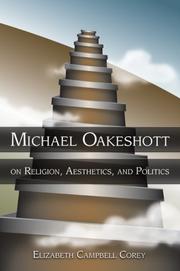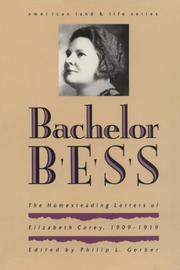| Listing 1 - 4 of 4 |
Sort by
|

ISBN: 0826265170 9780826265173 9780826216403 0826216404 Year: 2006 Publisher: Columbia : University of Missouri Press,
Abstract | Keywords | Export | Availability | Bookmark
 Loading...
Loading...Choose an application
- Reference Manager
- EndNote
- RefWorks (Direct export to RefWorks)
"Argues that Oakeshott's views on aesthetics, religion, and morality, which she places in the Augustinian tradition, are intimately linked to a creative moral personality that underlies his political theorizing. Also compares Oakeshott's Rationalism to Voegelin's concept of Gnosticism and considers both thinkers' treatment of Hobbes to delineate their philosophical differences"--Provided by publisher.
Aesthetics. --- Philosophy, Modern --- Political science --- Religion. --- Religion, Primitive --- Atheism --- Irreligion --- Religions --- Theology --- Political philosophy --- Beautiful, The --- Beauty --- Esthetics --- Taste (Aesthetics) --- Philosophy --- Art --- Criticism --- Literature --- Proportion --- Symmetry --- Philosophy. --- Psychology --- Oakeshott, Michael, --- Oakeshott, Michael Joseph, --- Radio broadcasting Aesthetics --- Aesthetics

ISBN: 1587290790 9781587290794 9780877453031 0877453039 9780877453024 0877453020 Year: 1990 Publisher: Iowa City University of Iowa Press
Abstract | Keywords | Export | Availability | Bookmark
 Loading...
Loading...Choose an application
- Reference Manager
- EndNote
- RefWorks (Direct export to RefWorks)
Farm life --- Frontier and pioneer life --- Pioneers --- Women pioneers --- Rural life --- Country life --- Frontier women --- Pioneer women --- First settlers --- Settlers, First --- Persons --- History --- Corey, Elizabeth --- South Dakota --- State of South Dakota --- Dakota Territory --- Social life and customs.
Book
ISBN: 1587299615 9781587299612 9781587299605 1587299607 Year: 2011 Publisher: Iowa City University of Iowa Press
Abstract | Keywords | Export | Availability | Bookmark
 Loading...
Loading...Choose an application
- Reference Manager
- EndNote
- RefWorks (Direct export to RefWorks)
Readers everywhere fell for Elizabeth Corey, the irrepressible, independent, and fearless Bachelor Bess, whose letters home to Iowa gave us a firsthand account of her adventures on a South Dakota homestead from 1909 to 1919. Now, through the letters she wrote home between 1904 and 1908, readers can make the acquaintance of a younger Bess facing the realities of life in an Iowa country school system with energy, enthusiasm, and ambition. Sixteen-year-old Bess wrote her early letters when she was away from the family farm, trying to complete the ninth
Teachers --- Rural schools --- Corey, Elizabeth
Multi

ISBN: 9780271060170 Year: 2021 Publisher: University Park, Pa Penn State University Press
Abstract | Keywords | Export | Availability | Bookmark
 Loading...
Loading...Choose an application
- Reference Manager
- EndNote
- RefWorks (Direct export to RefWorks)
| Listing 1 - 4 of 4 |
Sort by
|

 Search
Search Feedback
Feedback About UniCat
About UniCat  Help
Help News
News